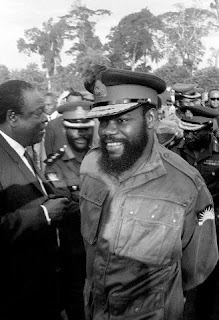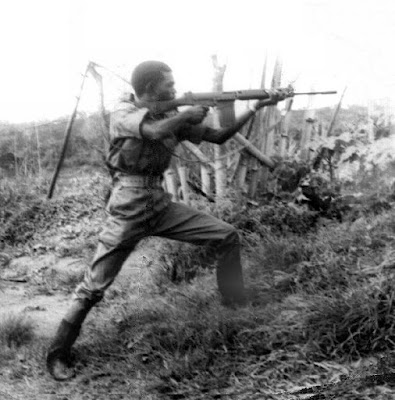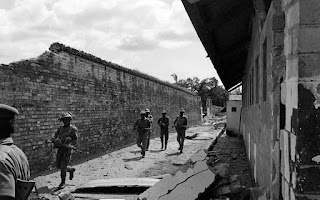THE OJUKWU INTERVIEW (3): Changing The Old Narrative
Chukwuemeka Odumegwu Ojukwu, Head of the republic of Biafra, flanked by his aides, attends a special parade at Ahiara, Biafra November 4, 1969, to celebrate his 36th birthday. Image: Goldsmith/Associated Press
In the heat of the civil war, blockaded by air, land and sea, what was left of the whole of Biafra, became something of a huge laboratory, a research institute, whose wide areas of interest encompassed the natural and social sciences, as well as commerce, manufacturing, theatre, arts and crafts, government and every other imaginable areas of human endeavour.
Biafra simply turned inwards and even began to surpass its own self, gaining in the process, truly giant strides in indigenous technology and social engineering, hitherto unheard of on the African continent. This took the world by surprise.
Even in the middle of an excruciating war, the fledgling republic still found the capacity to research into and manufacture even products like cosmetics, for future use of its women; the travelling theatres and pop musicians still performed to wounded and recuperating soldiers in the rear, to cheer them up and make lighter, their burdens. Of course, the Biafran scientists were unsurpassed in their forays into the creation and manufacture of new weapons of war and provision of various fuels required to power the various machinery.
However, probably less attention was paid to the emerging, new, indigenous system of governance that was slowly evolving in Biafra, particularly, following the Ahiara Declaration. The energies and synergies within Biafra were indeed remarkable and it was becoming clear, by the day, that this new nation, if allowed to survive, would completely change the old narrative of Africa being the sinkhole for every kind of foreign experiment.
Said Ojukwu, of the Nigerian Constitution and our apparent lack of initiative in charting the course of our own lives: “I think we’ve been very lazy, actually. We’ve been very lazy; we’ve been content to create a patchwork of imported ideas. I think it’s a mistake. We are and we have enough brain power in Nigeria to evolve a different system that suits us…”
Let us look at the systems of government we’ve so far tried our hands at in this country. How would you compare and contrast the presidential and parliamentary systems of government?
I personally feel the presidential system is a good one. I think for a country, for a society that is developing, like ours, you need a certain concentration of power at the top. We are not yet very able to manage opposition. And I think that’s a lot of waste of time, effort and so on.
Let’s look at it: is there, in fact, an Igbo word that distinguishes your opponent from your enemy? That is the crux of the matter…(laughter)…
Sir, you bring a cultural dimension into this whole matter and in this regard, I would like to know if you think that the several institutions and systems of the white man that we simply copied and replicated here, are actually suitable and working for us? In Biafra, for instance, you did a lot of consulting, mostly with the elders – which was truly a traditional Igbo system of arriving at public policy. Shouldn’t these traditional methods of approaching issues actually work better for our people?
I think we’ve been very lazy, actually. We’ve been very lazy; we’ve been content to create a patchwork of imported ideas. I think it’s a mistake. We are and we have enough brain power in Nigeria to evolve a different system that suits us.
Let me give you an example. You’ve talked about my consultation with the elders [in Biafra]. Yes, to me, it was natural and I know that in Igbo society, consultation is very important. Each individual is a king in himself. He likes, therefore, to be consulted. It doesn’t mean that in consulting him, he gives you advice, no. But he does appreciate the ritual, that recognition that he is important. Now, in our own evolution in politics, I think we could, in fact, almost institutionalise it, modernise it and go ahead. It would have a closer link to our innate selves.
Take the other point that I always search: the European notion of crime and punishment. Our own notion of punishment contains an essential element of repair. The European system does not contain that. And actually, the Igbo man – let me say this – does not understand why somebody comes into his house, breaks up everything, hits his wife across the face, steals his property and then, finally, you find him guilty and what do you do? You send him to prison for eight months…(laughter)…what has that done to the man who has suffered damage?…(more laughter)…it’s meaningless to the Igbo man and this is a problem.
Actually, I believe that we do not have faith in our law courts. The law court is the place for the clever one, the cunning one, the one that has money. It is not where you go to find justice, as we are happy with, comfortable with. There are many aspects of our present-day society that we’ve just taken things haphazardly because we are too lazy to think differently. And we have a lot of difficulties with them. None of these things can be changed overnight, of course. But actually, if we think and turn our mind to trying to modernise our own destiny, perhaps we would be more comfortable in our own society.
If you were given the opportunity, would you draw from some of your vast experiences, like those from the Biafran Consultative Assembly, to make changes to our present Constitution, with a view to making it better, or are you satisfied with it, the way it is?
Oh, I have already said – at the University of Nigeria, Nsukka, I think it was – that there are certain things that I feel should be reconsidered. You see, the document we were given as the Constitution was very good in blocking a lot of things that plagued the previous Republic. I don’t think it was forward-looking enough. And the Constitution, also fails, I believe, in its Preamble. The Preamble of our Constitution is not really inspiring. It should be the sort of document that when one reads, his heart should be pounding – we didn’t do enough on that.
There are aspects I find – for example, the notion of winner, wins all – is accepted in a Presidential System, but the loser, loses all. This is very frustrating and creates, in the society, a lot of disenchantment. Take, today, we have six political parties. Each political party has a presidential aspirant but out of the six, only one will become a president. What happens to the [other] five in the next four years? There is no institutional possibility for them to be constructive. They are forced into opposing.
I mean, what sort of country do you think we would have today if the Owelle of Onitsha and Chief Obafemi Awolowo were both in the Senate, debating crucial issues, making suggestions, convincing the legislators, the senators? They would be far more able to help us than being pushed aside, to stay on the sidelines for four years. The only thing, don’t forget – and I don’t mind – is breed mischief. The only thing left for them is to try and bring down the government so that they have another opportunity…(chuckles)…it’s a mistake we’ve made. There are others.
Anybody can aspire to be president but I believe that once he fails, he should have, within the institution, another possibility of serving. If you fail, as a presidential candidate then, perhaps, you could become a senator; if you fail as a senator, perhaps, you could become a governor. There are many other things that should have been foreseen but right now, you sit quietly in your room, you then take a plunge: I will go for president!
You are the top man in your party but you just miss it. And it could, in fact, end up by one vote and then you are out of it for the next four years. The only possibility you have is to bring down the government so that you have another chance…(chuckles)…these things should be staggered so that, okay, if I try this and it doesn’t work, I can go for that. It should help because, right now, the problem is that there are so many people with presidents written on their foreheads and they can be nothing else but presidents…(general laughter)…
In the heat of the civil war, blockaded by air, land and sea, what was left of the whole of Biafra, became something of a huge laboratory, a research institute, whose wide areas of interest encompassed the natural and social sciences, as well as commerce, manufacturing, theatre, arts and crafts, government and every other imaginable areas of human endeavour.
Biafra simply turned inwards and even began to surpass its own self, gaining in the process, truly giant strides in indigenous technology and social engineering, hitherto unheard of on the African continent. This took the world by surprise.
Even in the middle of an excruciating war, the fledgling republic still found the capacity to research into and manufacture even products like cosmetics, for future use of its women; the travelling theatres and pop musicians still performed to wounded and recuperating soldiers in the rear, to cheer them up and make lighter, their burdens. Of course, the Biafran scientists were unsurpassed in their forays into the creation and manufacture of new weapons of war and provision of various fuels required to power the various machinery.
However, probably less attention was paid to the emerging, new, indigenous system of governance that was slowly evolving in Biafra, particularly, following the Ahiara Declaration. The energies and synergies within Biafra were indeed remarkable and it was becoming clear, by the day, that this new nation, if allowed to survive, would completely change the old narrative of Africa being the sinkhole for every kind of foreign experiment.
Said Ojukwu, of the Nigerian Constitution and our apparent lack of initiative in charting the course of our own lives: “I think we’ve been very lazy, actually. We’ve been very lazy; we’ve been content to create a patchwork of imported ideas. I think it’s a mistake. We are and we have enough brain power in Nigeria to evolve a different system that suits us…”
Let us look at the systems of government we’ve so far tried our hands at in this country. How would you compare and contrast the presidential and parliamentary systems of government?
I personally feel the presidential system is a good one. I think for a country, for a society that is developing, like ours, you need a certain concentration of power at the top. We are not yet very able to manage opposition. And I think that’s a lot of waste of time, effort and so on.
Let’s look at it: is there, in fact, an Igbo word that distinguishes your opponent from your enemy? That is the crux of the matter…(laughter)…
Sir, you bring a cultural dimension into this whole matter and in this regard, I would like to know if you think that the several institutions and systems of the white man that we simply copied and replicated here, are actually suitable and working for us? In Biafra, for instance, you did a lot of consulting, mostly with the elders – which was truly a traditional Igbo system of arriving at public policy. Shouldn’t these traditional methods of approaching issues actually work better for our people?
I think we’ve been very lazy, actually. We’ve been very lazy; we’ve been content to create a patchwork of imported ideas. I think it’s a mistake. We are and we have enough brain power in Nigeria to evolve a different system that suits us.
Let me give you an example. You’ve talked about my consultation with the elders [in Biafra]. Yes, to me, it was natural and I know that in Igbo society, consultation is very important. Each individual is a king in himself. He likes, therefore, to be consulted. It doesn’t mean that in consulting him, he gives you advice, no. But he does appreciate the ritual, that recognition that he is important. Now, in our own evolution in politics, I think we could, in fact, almost institutionalise it, modernise it and go ahead. It would have a closer link to our innate selves.
Take the other point that I always search: the European notion of crime and punishment. Our own notion of punishment contains an essential element of repair. The European system does not contain that. And actually, the Igbo man – let me say this – does not understand why somebody comes into his house, breaks up everything, hits his wife across the face, steals his property and then, finally, you find him guilty and what do you do? You send him to prison for eight months…(laughter)…what has that done to the man who has suffered damage?…(more laughter)…it’s meaningless to the Igbo man and this is a problem.
Actually, I believe that we do not have faith in our law courts. The law court is the place for the clever one, the cunning one, the one that has money. It is not where you go to find justice, as we are happy with, comfortable with. There are many aspects of our present-day society that we’ve just taken things haphazardly because we are too lazy to think differently. And we have a lot of difficulties with them. None of these things can be changed overnight, of course. But actually, if we think and turn our mind to trying to modernise our own destiny, perhaps we would be more comfortable in our own society.
If you were given the opportunity, would you draw from some of your vast experiences, like those from the Biafran Consultative Assembly, to make changes to our present Constitution, with a view to making it better, or are you satisfied with it, the way it is?
Oh, I have already said – at the University of Nigeria, Nsukka, I think it was – that there are certain things that I feel should be reconsidered. You see, the document we were given as the Constitution was very good in blocking a lot of things that plagued the previous Republic. I don’t think it was forward-looking enough. And the Constitution, also fails, I believe, in its Preamble. The Preamble of our Constitution is not really inspiring. It should be the sort of document that when one reads, his heart should be pounding – we didn’t do enough on that.
There are aspects I find – for example, the notion of winner, wins all – is accepted in a Presidential System, but the loser, loses all. This is very frustrating and creates, in the society, a lot of disenchantment. Take, today, we have six political parties. Each political party has a presidential aspirant but out of the six, only one will become a president. What happens to the [other] five in the next four years? There is no institutional possibility for them to be constructive. They are forced into opposing.
I mean, what sort of country do you think we would have today if the Owelle of Onitsha and Chief Obafemi Awolowo were both in the Senate, debating crucial issues, making suggestions, convincing the legislators, the senators? They would be far more able to help us than being pushed aside, to stay on the sidelines for four years. The only thing, don’t forget – and I don’t mind – is breed mischief. The only thing left for them is to try and bring down the government so that they have another opportunity…(chuckles)…it’s a mistake we’ve made. There are others.
Anybody can aspire to be president but I believe that once he fails, he should have, within the institution, another possibility of serving. If you fail, as a presidential candidate then, perhaps, you could become a senator; if you fail as a senator, perhaps, you could become a governor. There are many other things that should have been foreseen but right now, you sit quietly in your room, you then take a plunge: I will go for president!
You are the top man in your party but you just miss it. And it could, in fact, end up by one vote and then you are out of it for the next four years. The only possibility you have is to bring down the government so that you have another chance…(chuckles)…these things should be staggered so that, okay, if I try this and it doesn’t work, I can go for that. It should help because, right now, the problem is that there are so many people with presidents written on their foreheads and they can be nothing else but presidents…(general laughter)…
SOURCE: THE PEOPLES EYE




Comments